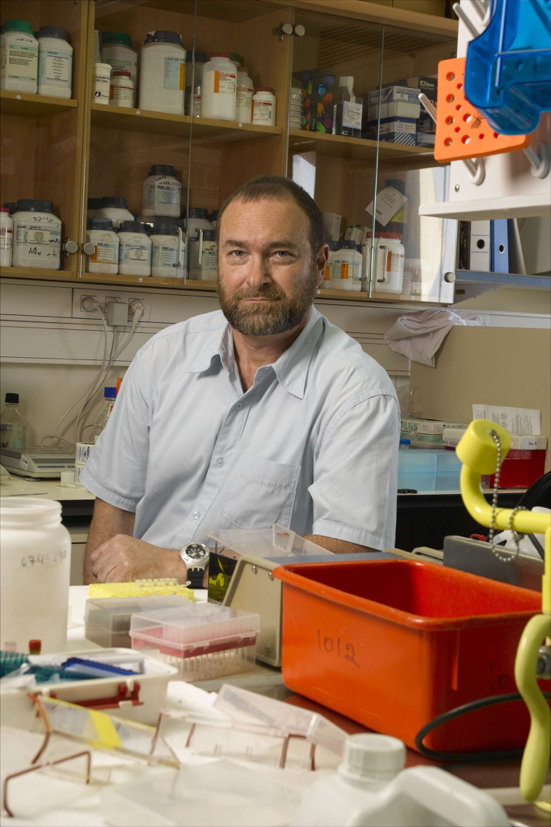The researchers from Tel Aviv University and the Hebrew University, the research gives hope for the development of future treatment for juvenile diabetes patients

A new study by Prof. Shimon Efrat, from the Sackler School of Medicine at Tel Aviv University, and by Prof. Nissim Benvanisti from the Institute of Life Sciences at the Hebrew University, published in the July 2011 issue of the journal Cell Stem Cell, gives hope for the development of an effective treatment for juvenile diabetes.
The technology developed by the researchers and the members of their laboratory staff enables the conversion of beta cells in the pancreas (the insulin-producing cells, which are missing in juvenile diabetics) into stem cells, multiplication and the conversion of the newly formed cells back into beta cells. The new method may help in the future to overcome the lack of donors that prevents the ultimate solution for diabetes - a pancreas transplant.
Pancreatic beta cells are destroyed in type 1 diabetes (juvenile diabetes). Pancreas transplantation makes it possible to replace the damaged cells with normal cells, but the main difficulty in the widespread use of transplantation is the lack of donors, in a ratio of approximately 1:1,000 between donors and patients, and this against the background of the fact that the pancreas can only be donated from the dead.
One of the researched solutions is the use of embryonic stem cells - those that have not yet differentiated into a certain type of cell in the body and therefore can be transformed into pancreatic cells, since, unlike pancreatic cells, these cells can be multiplied and receive unlimited amounts of insulin-producing cells. But according to Prof. Efrat, there are practical problems in "convincing" the cells to become beta cells. In recent years, a new technology has been developed to reprogram adult cells (connective tissue cells for example, due to their ease of obtaining), so that they turn back into stem cells, similar to embryonic stem cells. These cells are called induced pluripotent stem cells and are a potential source of cells for the treatment of various diseases.
However, as Prof. Efrat, who specializes in beta cells, Prof. Benvanisti, who specializes in stem cells, and doctoral students Uri Bar-Nor and Holger Ross found, it is difficult to turn connective tissue cells, which have been reprogrammed into stem cells and have undergone proliferation, into pancreatic cells.
From pancreatic cells to stem cells and back to pancreatic cells
In the new method, the researchers took beta cells from a human pancreas, turned them into induced stem cells, multiplied them, and the newly obtained cells turned back into pancreatic cells. According to the researchers, the induced stem cells produced from human beta cells retain a "memory" of their origin in some of the proteins associated with their genes, and are therefore more effective in differentiating back to beta cells, after the multiplication stage in the laboratory.
Prof. Efrat elaborates: In the first step, we developed a way to mark human beta cells in culture so that they can be followed even when they undergo reprogramming. This is how we make sure that a line of embryonic stem cell-like cells produced from them actually originates from beta cells. Otherwise, since you start from a mixed population of cells, once the original identity of the cell is erased, it is no longer possible to identify the source."
After producing the induced stem cell lines, the researchers were able to transform them more efficiently (relative to other stem cells) into insulin-producing cells that can be transplanted.
"The use of these cells promises to improve the production efficiency of beta cells in the laboratory, with the aim of creating an unlimited source of cells for transplantation in diabetic patients from a limited number of donors" concludes Prof. Efrat.
The development is one of the technologies that served as a basis for the establishment of Stem Cell Therapeutics Ltd. (SCT) operating in the Van Leer greenhouse in Jerusalem since May 2011.
The SCT company received a license for this technology from Ramot, the technology commercialization company of Tel Aviv University, and Maiyam, the technology commercialization company of the Hebrew University of Jerusalem. , SCT which was established as part of a strategic collaboration between Pontifax and Roche, began promoting its research and development in May of this year with the aim of developing an innovative treatment for diabetes.
Citation of the article in the journal: Cell Stem Cell

8 תגובות
Greetings
Please I want the research address
When will it go into effect in the health funds?
Stunning
Very nice
It will also eliminate the pharmaceutical industry in the field
I hope he succeeds
And in the meantime we will all take care of ourselves and take care of our health
Amen and Amen to cure this damned disease already!!!
Amazing another step in the right enlightened and scientific direction
Stunning!